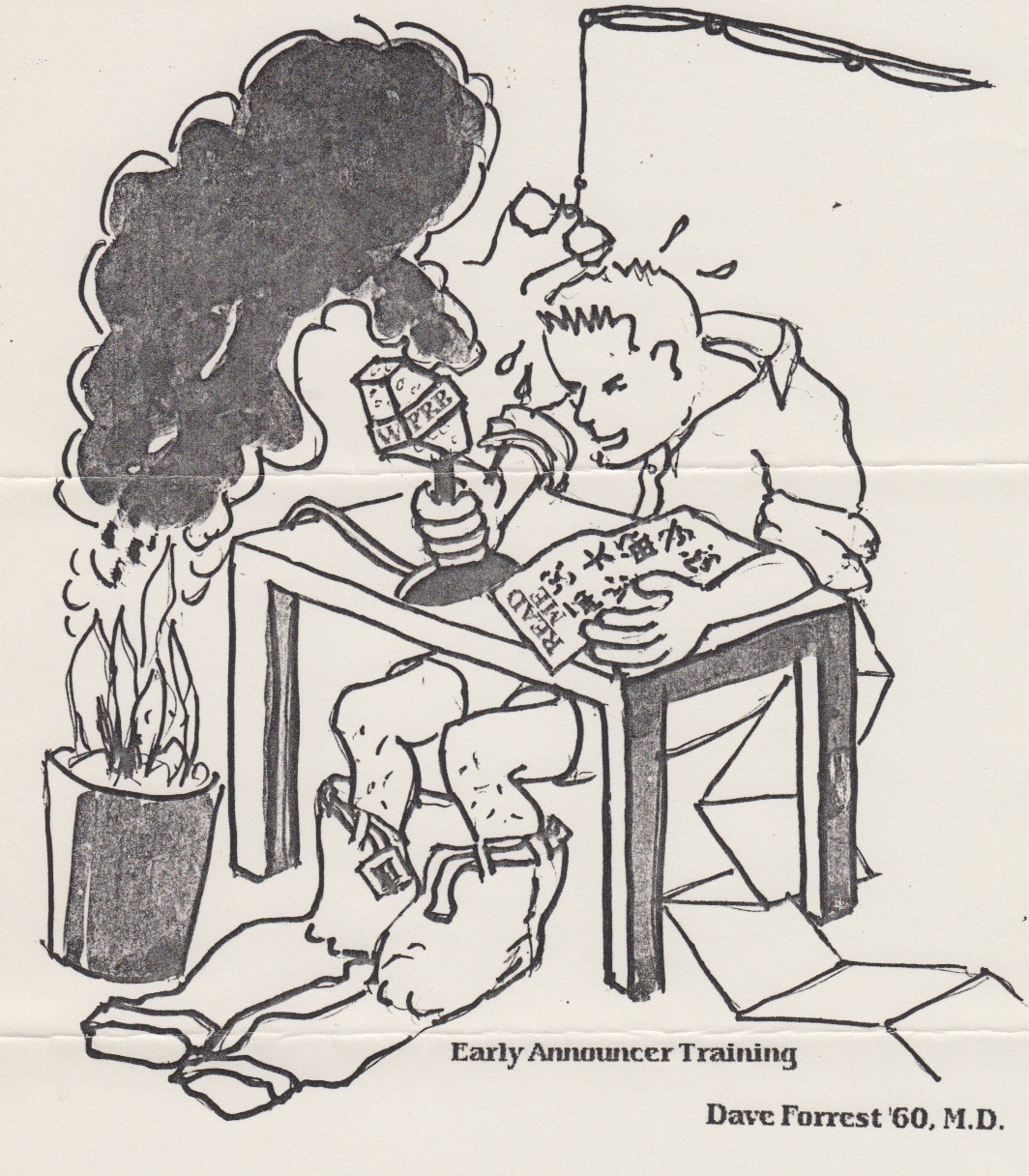On the Lasting Benefits of the WPRB Experience

[By Dave Forrest ’60]
Reminiscences of the heroic age of PRB in the late 50’s retain their noble lustre beneath the encrusted molluscs and other crud of time. Other contributors to this [project] will no doubt limn the brilliant PRB trajectories of such mythic figures as Siggins, Crowther, McGuire, Dunn, Fuellhart, McCracken, Miller, McGiffert, Fleishhaker, Medina, et al. and the promulgated joys of midcult and masscult offerings of the station.
From my own more modest role as a classical chamber music and news announcer, which gave me my desired access to the classical music sections of the Princeton record stores, I would wish to recall the guidance I received from my classmate and Director of the Classical Music Department, John Becker, whose gracious erudition saved me from disastrous gaffes and humiliating mispronunciations on countless occasions. At the time the brilliant technical innovations of Marty Sperling, a physics major with the intellect of an Euler or a Tesla who resisted the pressures of a liberal arts university to become merely cool, had greatly expanded our listening audience, and cultivated listeners from as far away as Manhattan, not to mention the Institute for Advanced Studies, would call the station to hound us about any errors on the air (“That’s not how one says I Musici”). Most classical fans are at home in French, German, Italian, or Spanish, but when one ran across Xenakis’ Metastasis, Pithoprakta and Eonta, or when Weinrich sat down to play the Toccata and Fugue at the Vårfrukyrka organ at Skänninge, what was a poor announcer to do? It was Becker to the rescue! In the enviable way that some Europeans do, particularly those with family in Liechtenstein, John had mastered all the rest of the languages as well, and was never less than kind and merciful in his instructions.
Apart from history of the station, I would like to add a note of gratitude for the lasting benefits to me of the PRB experience. First of all, there were the elocution lessons that abolished any vestiges of my New York regional accent at an early and pliable age. I can still mentally hear senior members of the station working on the Arkansas accent of my freshman year roommate, Ham Satterfield! As a psychiatrist I have benefitted inestimably from this voice training as no one can tell where I come from (perhaps the Midwest?). This anonymity has greatly freed up and thus aided the transference projections of a variety of my patients. When I went to Vietnam as an Air Force psychiatrist serving with the U.S. Army, I had no trouble doing spots for the Armed Forces Radio Network to try to prevent drug abuse. These were received with less than solemnity by many, but no matter. The PRB preparation for a lifetime of teaching and lecturing was superb. Once while still in the ‘Nam I was asked to lecture without a microphone in an open hangar to the Dustoff helicopter crews as the choppers took off and landed behind me, and once to the assembled Army chaplains aboard the Army’s “navy” cruising down Saigon harbor. Later as a member of the Columbia P & S Psychiatry department, I became involved in a project supported by the Mellon Foundation to make an Electronic Textbook of Psychiatry on videocassette that has been distributed to over 300 medical centers. This involved on-camera announcing and also voiceovers, scripting and editing with professional technicians, in all of which I relied heavily on my PRB background, while other doctors stumbled, fumbled, and generally looked unprofessional. Subsequent appearances on TV shows such a morning TV show on the problems of Vietnam veterans, or Pat Collins (drug abuse in the ballet world) and Financial News Network radio interviews on the problems of “NERDS or Neuroevolutionary Rostral Developers” could be taken in stride. I never hesitate, as in a Grand Rounds at Columbia P & S on Neural Networks, to integrate technical slide visual aids and video material at a rapid pace, including computer sequences shown on videotape. This is because at PRB I acquired the confidence to do precise and accurate integration of a variety of materials within tight time constraints.
